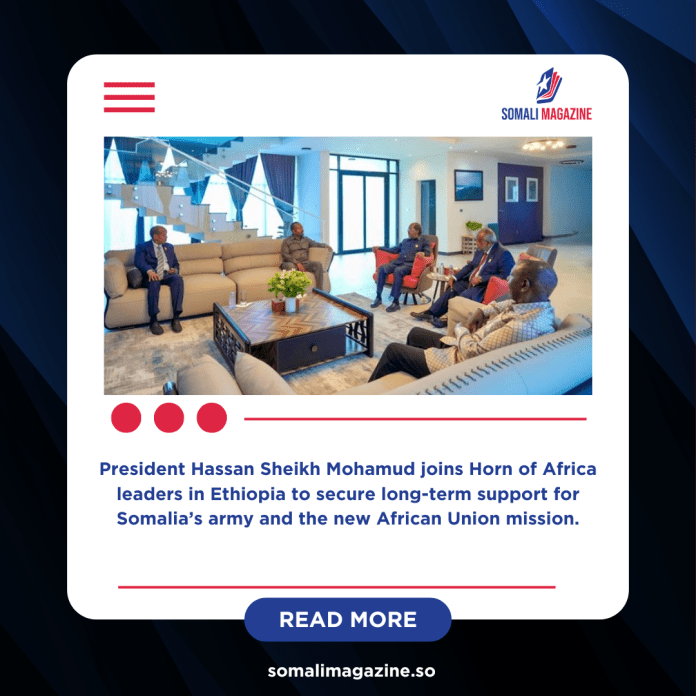Facebook Twitter (X) Instagram Somali Magazine - People's Magazine
Somali President Hassan Sheikh Mohamud on Wednesday took part in a high-level regional meeting in Guba, Ethiopia, where discussions focused on finding sustainable funding to support Somalia’s ongoing security transition. The meeting brought together leaders from across the Horn of Africa, reflecting the importance of collective efforts to defeat terrorism and stabilize the region.
The talks centered on ways to sustain support for the Somali National Army as it takes on more responsibility for securing the country, and on the role of the newly established African Union Support Mission in Somalia (AUSSOM). This new mission has now replaced the African Transition Mission in Somalia (ATMIS), which had been at the heart of international peacekeeping efforts in the country. The creation of AUSSOM marks a new phase, one that emphasizes gradual transfer of security duties to Somali forces while ensuring that the progress already made in the fight against Al-Shabaab is not lost.
In attendance at the meeting were Djiboutian President Ismail Omar Guelleh, Kenyan President William Ruto, Ethiopian Prime Minister Abiy Ahmed, and the Chairperson of the African Union Commission. Their presence underlined the significance of regional solidarity in addressing Somalia’s challenges, as instability within its borders often spills over into neighboring states.
The leaders agreed that long-term, predictable financial support is critical to ensure Somalia can continue building its security forces and institutions. They commended the Somali government and its allies for the recent gains made against extremist groups, acknowledging that while much progress has been achieved, the threat posed by Al-Shabaab remains serious. The group continues to launch deadly attacks in Somalia and has occasionally struck neighboring countries, making it a regional concern rather than a problem confined within Somali borders.
President Hassan Sheikh Mohamud used the platform to reassure regional partners that Somalia remains firmly committed to developing a self-sufficient national army capable of protecting its people and its territory. He highlighted that the Somali government is determined to reduce dependency on external forces and to take charge of its own security. According to him, the establishment of AUSSOM is designed to serve as a bridge during this critical transition period, helping Somalia buy time to train, equip, and expand its national army.
The Somali leader emphasized that this transition is not just about military force but also about building the foundations of peace and stability across the Horn of Africa. He stressed that defeating Al-Shabaab requires more than battlefield victories — it also involves strengthening governance, improving service delivery, and fostering unity among Somali people. By combining these efforts with international support, he argued, Somalia can secure lasting stability that benefits not only its citizens but the wider region.
For the other leaders present, the stakes are equally high. Kenya, Ethiopia, and Djibouti have all contributed troops to previous peacekeeping missions in Somalia and continue to face threats linked to Al-Shabaab. They therefore recognize that Somalia’s success in defeating terrorism directly strengthens their own national security. The African Union Commission also underscored the importance of coordinated international backing to prevent a relapse into conflict.
The meeting concluded with a joint understanding that the way forward lies in shared responsibility. While Somalia works to build a capable army and institutions, regional partners and the wider international community must step in with reliable funding and technical assistance. The leaders expressed confidence that, with determination and cooperation, Somalia can move closer to achieving lasting peace, stability, and sovereignty.
This gathering in Guba served as yet another reminder that Somalia’s security challenges cannot be solved in isolation. The future of Somalia, and indeed of the Horn of Africa, depends on a balanced combination of Somali ownership and regional and international support. The decisions made at this meeting could therefore play a crucial role in shaping not only the stability of Somalia but also the wider security dynamics of the region.

